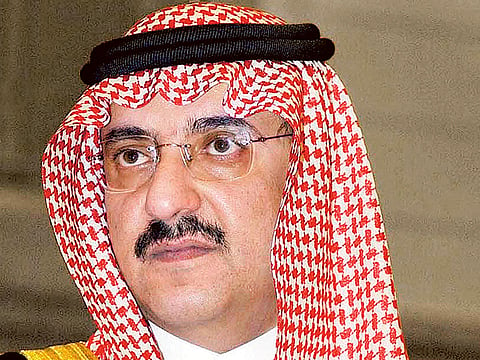Mohammad Bin Nayef takes leading role in Saudi Arabia
Prince Mohammad Bin Salman, newly appointed Minister of Defence, is rising star within the ruling family

Beirut: During a long decade, the late King Abdullah Bin Abdul Aziz created 11 committees and councils to run the affairs of Saudi Arabia that, by universal account, found scarce supporters allegedly because of their bureaucratic burdens. On January 29, King Salman Bin Abdul Aziz abolished them all, including the powerful National Security Council (NSC) because, observers concluded, he wished to rekindle efficiency and accountability.
In addition to the NSC, which was headed by Prince Bandar Bin Sultan, the other ten councils and committees axed by the new monarch were the Civil Service Council, the Higher Committee for Education Policy, the Higher Committee for Administrative Organisation, the Higher Commission of King Abdul Aziz City for Science and Technology, the Supreme Council for Education, the Supreme Council for Disabled Affairs, the Supreme Council of King Abdullah City for Atomic and Renewable Energy, the Supreme Council for Islamic Affairs, the Supreme Council for Petroleum and Minerals, and the Supreme Economic Council.
Two mega institutions, the Council of Political and Security Affairs (CPSA), headed by Heir to the Heir Apparent and Minister of the Interior Mohammad Bin Nayef, and the Council of Economic and Development Affairs (CEDA), headed by the Minister of Defence Mohammad Bin Salman, replaced the 11 bodies. Both princes received open mandates to reorganise the kingdom’s affairs, introduce efficient methods, and display transparency. Inasmuch as these reforms were sweeping, it was critical to assess their intrinsic capabilities, if for no other reason than to determine what patterns might emerge.
The CPSA held its first meeting on February 11 under the leadership of Mohammad Bin Nayef as Riyadh telegraphed its renewed attention to security matters. Eight other members served on the CPSA, Prince Saud Al Faisal, the minister of foreign affairs (absent for medical reasons), Prince Mit‘ab Bin Abdullah, Minister of the National Guard, Prince Mohammad Bin Salman, Minister of Defence, Shaikh Saleh Bin Abdul Aziz Bin Mohammad Bin Ebrahim Al Al Shaikh, Minister of Islamic Affairs, Endowments, Call and Guidance, Lieutenant General Khalid Bin Ali Bin Abdullah Al Humaidan, the Chief of General Intelligence Directorate (GID), Adel Bin Zaid Al Turaifi, the Minister of Culture and Information, and two ministers of state, Dr Sa’ad Bin Khalid Al Jabri and Dr Musaid Bin Mohammad Al Aiban.
While Princes Mohammad Bin Nayef, Saud Al Faisal, and Mit‘ab Bin Abdullah were well known for their service to Crown and Country, the other five CPSA members were less so, even if much was expected from them as well.
Still, there was no doubt that the very existence of the CPSA, which was carefully planned months ago, highlighted the trust that the King placed in Prince Mohammad Bin Nayef, whose performances and efficiency stood out. Moreover, the monarch appreciated the level of cooperation between the minister of interior and various regional and international counterparts, as the kingdom fought extremists. His anti-terrorism policy in particular, which included a rehabilitation component that was highly efficient, produced favourable results in more ways than many assumed, as Riyadh coordinated with its GCC partners, various Arab states, and leading Western powers to weaken and destroy Daesh and similar organisations. What was unknown, however, was the level of cooperation between him and Prince Mohammad Bin Salman, the newly appointed Minister of Defence who was, by all accounts, the rising star within the ruling family.
Responsibilities
At 35, Prince Mohammad Bin Salman was probably inexperienced to assume so many responsibilities — in addition to his Ministry of Defence portfolio, he is the head of the Royal Court where he replaced Khalid Al Tuwaijri; president of CEDA and a member of the CPSA. By virtue of his two memberships in CPSA and the CEDA, he thus became the only member of the Al Saud family to sit on both councils, which is an undue concentration of power in the hands of a single individual. It is possible to infer, nevertheless, that his father appointed Prince Mohammad Bin Nayef as head of the CPSA precisely because he wished his son to learn from a far more experienced person, and not necessarily because the Minister of the Interior occupied a higher protocol position.
Be that as it may, what is intriguing about Prince Mohammad Bin Salman is what is expected of him, and while his reputation as a forthright prince who can get things done is acknowledged, it remains to be determined how he will counsel his monarch. Detractors point out to his inability to communicate fluently in English, an essential tool for such a high-ranking leader who must carefully negotiate with leading global powers that have expressed interest in the stability of the kingdom and the entire Arabian peninsula, although what is far more important is the young man’s willingness to provide his King the type of recommendation than may not always be welcome. Over the short-term, nevertheless, few observers anticipate clashes between the two Mohammads on the CPSA, with the Heir to the Heir Apparent enjoying a slight advantage.
— In his next essay, Senior Writer Joseph Kechichian will examine the Council of Economic and Development Affairs.
Sign up for the Daily Briefing
Get the latest news and updates straight to your inbox


